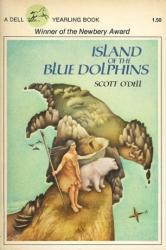
This book is about a girl who lives by herself on an island. It's a story of empowerment, as the main character learns to live and thrive alone. She doesn't seem to let her circumstances get the best of her. I'd recommend this novel to young girls in particular as the narrator is a strong and capable girl.
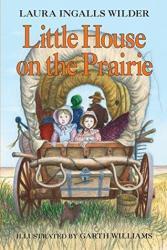
Such a classic. You might think that a book about frontier life on the prairie would be boring, but it's not. Well, I did skip a few places that detailed the construction of the cabin etc. Otherwise, it's relaxed in most places and downright exciting in others. The book is told from the perspective of the middle daughter, Laura Ingalls. I love that the author is writing about her family. Thumbs up!
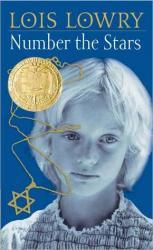
This is a powerful quick read with an engaging story line. Yes, Holocaust books are a dime a dozen, but this one is on top of the heap. The location of the book in Denmark also separates it from the rest. I was struck by the idea that it's easier to be brave when you don't know more than you need to to complete a task. Well done.
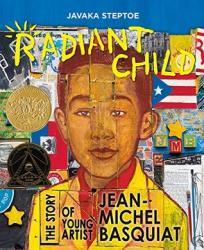
This is a beautiful book. It won the Caldecott Medal, so that's saying something. The artwork is fantastic. The book tells the story of Jean-Michel Basquiat's life in a free form jazz-inspired style. I'm not familiar with Jean-Michel Basquiat's work and now I want to see it for myself. There's a biography in the back. I only read this book once to my daughter. If I had read it more than once, I'd probably give it 5 stars.
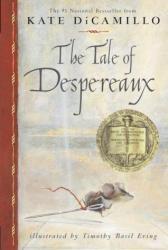
I started off in love with this book. However, as it progressed I lost a little bit of interest in it. I guess Miggory Sow and Roscuru didn't appeal to me as much. But it finished strong. Great narrative voice and well paced. Well done overall.
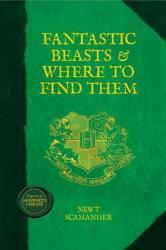
Cute cute cute! This is a fun book that is chock full of imagination. I liked that is was inscribed as Harry Potter's copy but Ron Weasley had amusing handwritten notes in it. I think this book may be best enjoyed by devoted Harry Potter fans. If you've seen the Fantastic Beasts movie, you may enjoy trying to pick out the beasts featured in it. Fun!
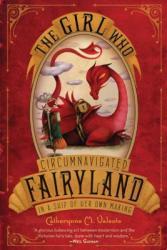
I've yet to read something by Catherynne M. Valente that isn't absolutely gorgeous -- admittedly I may be a little bit biased, as I definitely think folkloric stories are the best, and folkloric stories with lovely playful twists are the BEST best... But when it comes to evocative and clever prose, as far as I'm concerned Valente is on a level all her own. At the moment, I happen to be reading her "Fairyland" series, and so... Behold, the first book -- "The Girl who Circumnavigated Fairyland in a Ship of her Own Making!" It's just as whimsical as it sounds.
So there's this little girl named September, living in a lonely house and washing a bunch of lonely teacups all the time and feeling very trapped. A quirky and talkative Green Wind -- apparently a defiant and spirited sort of wind -- riding a leopard shows up to spirit her away to Fairyland if she likes. This book is very much like "Alice's Adventures in Wonderland" for the modern age: September has loads more authority over herself and her destiny, for one, and she grows dramatically as a human being over the course of the series. Fairyland helps that along of course, despite being a wild and alien place, complete with folkloric and/or mythological figures both eternal and re-imagined, petulant tyrants with very impressive hats, and interesting twists and turns aplenty that I can say I definitely didn't see coming. Valente's world is simultaneously familiar and wonderfully fresh, like she's composed words to go along to the tune of a well-beloved song, shifting its meaning in unexpected ways while still keeping true to the soul of something timeless.

Oh my goodness, Apollo, you strange and beautiful basket case. I was laughing all through this book, marking pages to shove at my friends... You know the drill. The Greek-mythology-centric Percy Jackson series as a whole helped me through some dark times when I was younger, and this first book of Rick Riordan's new "Trials of Apollo" series is delightful, just as I remember "The Lightning Thief" to have been back when I really, really needed it. (It's only missing Mr. D -- I've always especially liked Mr. D. Maybe he'll show up in the next one?)
Anyway. You know how in Greek folklore, Apollo gets stripped of his powers sometimes when he gets his king/dad, Zeus, angry? That's happened again in this series, only now it's all happening in modern day New York... Where the rules to everything are way different than what Apollo's used to... Annnnd he's not used to acne or helplessness, either, both of which he has to deal with as an awkward teen apparently named "Lester." It's the sparkly god of the sun/music/so many things's turn to go on actual quests again instead of waving demigods off on them... And he's very, very sad about it.
Some familiar faces from the Percy Jackson series have appeared so far in "The Hidden Oracle," but I would say it's definitely its own series with unique sources of pathos. Something I always loved about the Percy Jackson books is their empathy, the way people can redeem themselves, the way characters can still be heroic despite/because of their flaws... And that is STILL HERE, operating now through the protagonist, given the centuries worth of mistakes a now-human Apollo has to grapple with. I definitely liked "Magnus Chase and the Gods of Asgard: The Sword of Summer" -- the Riordan book that came out a bit before this one -- but it didn't click with me in nearly the same way as Apollo's shenanigans. "The Hidden Oracle" felt like a fresh and self-aware remix of old ideas and settings from Percy Jackson, all told through a recently fallen god's wonderful, WONDERFUL narration. Yes, if you want something completely different than Percy Jackson this might not be the best place to look. But if you want to see the Percy Jackson universe through refreshingly new and oh-so-Olympus-y eyes, this may be perfect for you!
To sort of sum things up: I think this is a great kids' book, engaging and fast-paced and written with a light and goofy sense of humor, just like those original Percy Jackson books. (Sometimes the humor does get VERY goofy, so go in warned, but other times it's clever and tongue-in-cheek. Funny guy, that Apollo. Versatile.) Beyond that, though, I...a grown adult...am 100% buying the next book for myself just as soon as it comes out. I know that doesn't necessarily mean EVERY mythology-loving adult equipped with a suitably goofy sense of humor would also enjoy this book, but I know for a fact plenty of others have the same plan.
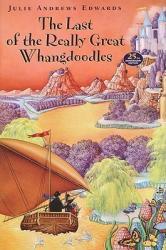
**Spoiler Alert** Let me just say this, don't read this book out loud to your young child. It took forever to get through it and I was so sick and tired of it by the end that it turned into a chore. I didn't really get into it, it just seemed silly to me, but my daughter liked it. A major sticking point for me was the author's failure to explain why the antagonists of the book were actually on the side of the Whangdoodle in the end. Meh.
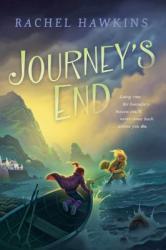
After her parents split, Georgia girl Nolie Stanhope finds herself spending her summer in a mysterious town called "Journey's End" in Scotland while her father investigates a mysterious fog (known as The Boundary) that's plagued the local village folk for centuries. Nolie is pretty excited - in addition to some sweet international travel, she's an avid ghost enthusiast, and feels like the summer might be promising in that department. And she is pretty immediately proven right! When Nolie and her new Scottish friend Bel see a weird dude walking down the beach, they think they've seen a ghost. Have they? And why is the Boundary suddenly moving closer to shore?
This was a pretty great MG ghost story. The setting is wonderful - Scotland sort of lends itself to mystery, and Hawkins imbues the village of Journey's End with a ton of charm, personality, and a touch of creepiness. Both of the lead characters, Bel and Nolie, were pretty well fleshed out with distinctive and likable personalities. Their friendship, while quickly formed, was believable and would be a great example for young girls. There's a bit of bullying and some exposition about the effects of divorce, so some important relatable issues are addressed. The Boundary itself is a fantastic and appropriately creepy mystery centerpiece. Really, my only complaint is that there was a ton of build-up to a mystery/ghost story that was pretty quickly and too easily resolved. But I'm a tough customer when it comes to middle grade reads, and overall, this one was pretty great so I'll go with the 4 star rating. I'll definitely be booktalking this one with sixth graders in the fall.
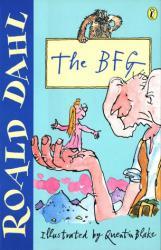
Lovely lovely book. I started off reading this to my 6 year old, but it's kinda scary so we stopped. I just had to finish it on my own. I love how the BFG talks and how whimsical the story is as a whole. It's Roald Dahl, what's not to love?
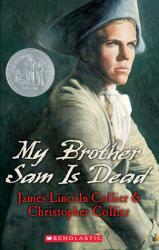
When I started this book I could not understand why it had been banned. It seemed so innocuous. I only read it because it was in the free pile where I work. I looked it up and it was for violence, language, and an unpatriotic view of the Revolutionary War. Fair enough. It is violent and unpatriotic for sure, which is why I liked it. It's also a very good story and is about as accurate an account of the Revolutionary War era as can be reasonably expected from a work of fiction for young people.
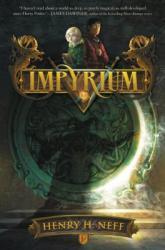
3000 years ago (aka present day), the earth suffered from "the Cataclysm" - an apocalyptic event that changed the literal shape of the earth (because earthquakes) as well as all of its political structures. In this future version of earth, technology has been all but outlawed, and magical folks are treated in a vastly superior way to those without magic. Hob Smythe is a non-magical miner living in the Dusk (outside of present-day Vancouver) who is recruited by a secret society called The Fellowship that wants non-magic folks to have the same rights as magic folks. He is quickly whisked away to the capital (Impyrium) where he is to spy on Hazel Faeregrine - the princess third in line to the throne that the Fellowship suspects is massively powerful. Meanwhile, Hazel is trying to learn how to wield her great magical power, while maneuvering and investigating interesting goings on in the palace.
As you can probably tell from that description, there is a lot of world-building that happens in this book. As a result, the beginning is a little slow, but after a few chapters, I found myself engrossed. Neff creates a dynamic world full of magic, demons, and dragons. The characters themselves are intelligent, likable (if a little gullible), and independent. If you like your heroes with pluck, you'll love Hazel and Hob. The story, once it gets going, is fairly complex, but in a really great way. There's a lot of plotting and conspiracies and it's really fun to try to figure out what is happening along with Hazel and Hob. A lot of little threads are introduced, and many plot points are tied up in the end while still paving the way for the next installment in the story. Additionally, there is fun social commentary in terms of non-magic vs. magic folks and their respective treatments.
I liked this enough that I immediately put the author's companion series, which is called The Tapestry and tells about the events of the Cataclysm, on hold. This is probably my favorite non-sequel middle grade read of the year. Recommended for fantasy readers of all ages. 4 stars.
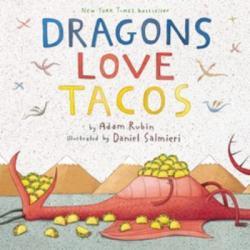
This story has it all, from tacos, to laugh out loud humor, to dragons, to colorful illustrations, and most importantly you also learn about why NEVER to give dragons totally mild salsa with jalapenos. The results are action packed, disastrous, and hilarious. Luckily, the dragons make everything right in the end.
This book is just plain old fashioned silly, and even a bit absurd, fun! The pictures in this book really capture the tone and elevate and enhance the story rather than get in the way. I'd even argue that they might be the main draw of this already entertaining book. The illustrator, Daniel Salmieri, didn't take the illustrations too seriously and you can tell they had as much fun making the book as you will reading it. Enjoy this lighthearted, humorous romp and feel free to enjoy a few tacos along the way when reading!
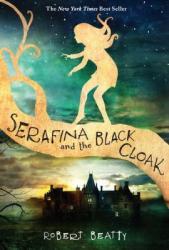
Serafina is the Chief Rat Catcher at Biltmore Estate in Asheville, NC in 1899. She and her Pa secretly live in the basement, where he is basically the electrical engineer of the place. Serafina's presence in the house is a secret so she mostly traverses the estate through tunnels and doesn't go outside. One night, she witnesses a man in a black coat magically abducting a child, which changes everything.
I listened to this book, and the narrator didn't really do it any favors. Her Southern accent was pretty terrible, but thankfully, she kept forgetting to use it. Narration aside though, this book had some problems. The author took a cool premise and an even cooler setting and then wrote a really boring book. There were kind of two main things going on that should have been really interesting, but weren't. The first thing was the identity of the man in the black coat, which was painfully obvious from the start. Had Beatty done a kiddo type version of an Agatha Christie novel (these are the people at the Biltmore estate...and one of them is guilty of MURDER MOST FOUL), I'd probably be typing a really different review right now. Alternatively, he could've played up Serafina's secret a bit more, and that might have made things more interesting. As it was, even though there was a lot going on, nothing of importance ever seemed to really happen.
I also found myself getting annoyed by a fictional Vanderbilt named Braedan (weird name for a kid of Dutch origins in 1899, dontcha think?) who is a bit of a love interest. Every part featuring him was pretty painful as Serafina basically becomes a useless quivering mess when he's around. Blegh. Oh, and at one point, a character says something along the lines of "you don't call girls heroes, you call them heroines" which, just, are you trying to say that girls can't be heroes? Because if so, gross. I'm paraphrasing, but that's what I took away from the statement.
But on the other hand... look at that cover! Gorgeous.
If 1.5 stars was an option, that's what we'd be doing here. I liked the beginning, the premise and the setting, but wish the author had done more with the latter two elements.
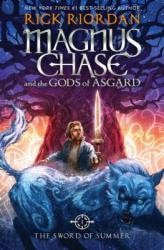
Popular mythology author Rick Riordan strikes again! He has series delving into Greek, Roman, Egyptian, and now NORSE mythology. This series follows Magnus Chase, son of a Norse god. Which god, you ask? Read the book and find out!
Riordan’s writing style is very distinct, playing to his youthful audience. The chapter titles were humorous and made no sense until I reached those parts of the book. (I read through them initially and thought, “What the…?!”)
Magnus Chase was vaguely--well, maybe more like strongly--reminiscent of Percy Jackson for me. Although Magnus has had a much rougher life so far, his voice is very similar to that of Percy. Magnus Chase is barely 16 years old, but he has been living on the streets for the past 2 years since his mother’s death. After an...interesting encounter with a fire giant, he finds himself gracing the halls of Valhalla with other Norse warriors killed in battle. Along with his valkyrie, a dwarf, and an elf, he goes on a quest to retrieve the Sword of Summer and stop the wolf Fenrir from escaping his bindings.
A interesting read for those die-hard Riordan fans or anyone who loves mythology interpretations. I was very entertained by the story, as I always am with Riordan’s mythologies, but despite the gods changing, the stories are starting to run together. The overlap of stories definitely doesn’t help the blurring of the lines. (Oh, hi Annabeth!) Crossing over from the Percy Jackson series, Annabeth, last name Chase--I guess we could have seen this one coming--has a couple nice little cameos in this book, foreshadowing a larger role later in the series. I’ll be interested to see where this goes.
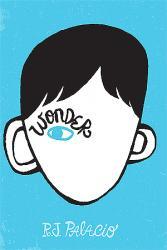
This review contains spoilers.
This is the second time I've read this book. I got more out of it this time. It helped to google Auggie's condition to see what he would have looked like. There were a few chapters about friendship, betrayal, and bullying, that were so powerful I got misty-eyed. I liked that the school ultimately accepted him and loved him. I also liked Via's friend's storyline. Perhaps my favorite part was at the end when he got the award and said that they saw something exceptional, but he just saw himself as a normal kid. But hey, he'd take the award if they wanted to give it to him. :-)
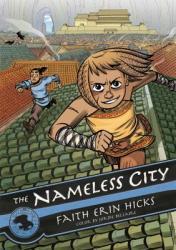
Kaidu is new to the Nameless City. This is a city so frequently conquered that no name, despite thousands, sticks. He's trying to become a warrior, make friends, and know his father but all three tasks seem unlikely for the shy boy. Then he meets Rat, a street-smart girl who has the ability to think on her feet and run quickly. They form a friendship and manage to save their city from an upcoming threat that could change who runs the city. Fans of Avatar the Last Airbender comics or TV show would adore this series. It's new, it's refreshing, and follows an interesting and still developing story arch. I couldn't put it down as I turned page after page of beautiful illustration and compelling story. There are many cultures at war with one another in the still, albeit temporarily, peaceful city. The first in the series, I look forward to watching the story take shape and tackle complex issues about identity, war, friendship, and trust. It was really enjoyable and I highly recommend it!
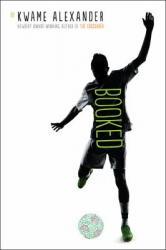
Nick Hall has everything going for him: he's doing well in school, he's got a solid flirtation going with his crush (or...limerence as it were), and most importantly, he made the soccer travel team. And so, of course, everything starts to go wrong. His parents separate, he starts to get bullied and his best friend ends up on a soccer team 30 miles away.
Booked is absolutely in no way the type of book I would normally pick up, but despite that, I thought it was fantastic. It's a sports fiction novel written in verse neither of which are my thing, but man, I get why Crossover won that Newbery if it was anything like this. In very few words, Alexander manages to develop complex characters, create humor, and develop and subsequently neatly (a little too neatly, perhaps, but hey, it is a book for kids) tie up several plot lines. Oh! And the words! There is a fun little subplot in which Nick's dad wrote a dictionary, and it leads to some really awesome word play. I also learned a few new fun vocabulary words to throw around.
Anyway, my final thought is really just...wow. I'm impressed. I'll definitely be booktalking this one. And even though, like I said, it's not my thing AT ALL, I'll probably read Crossover, Alexander's other book. 5 stars.
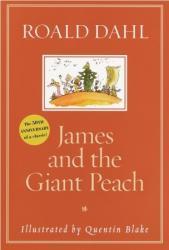
Roald Dahl specializes in tapping into the feelings of injustice that kids experience. It's frightening when you first find out life isn't fair. But he rights this wrong by imposing justice where oppression once existed.
This is and odd book. There are giant peaches, giant talking bugs, and cloud monsters! But it was endearing and enjoyable.
My 6.5 year old daughter was riveted off and on throughout the story, but I think the target audience is a bit older.


